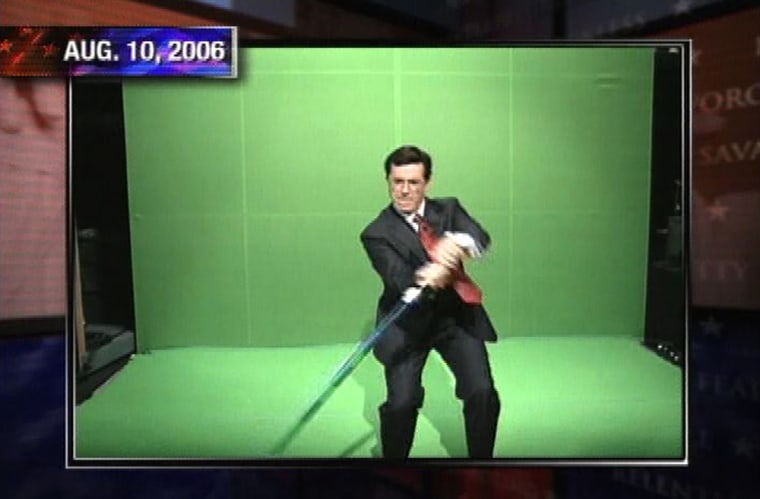While many of his television brethren have been more wary of YouTube and the Web, Stephen Colbert is urging his fans to make him a viral-video star.
On Aug. 10, Colbert showcased his lightsaber skills in front of a green screen on his Comedy Central show “The Colbert Report.” Soon, fans were filling in the background with video, placing the host in the realm of “Star Wars,” and posting them online.
Earlier this week, Colbert announced that he would broadcast the best submissions, or as he called them: “bold depictions of my heroic fight.”
Hoping for more videos, Colbert threw down the gauntlet, announcing the “Stephen Colbert’s Green Screen Challenge.” Already, a number of entries have been rolling in on YouTube, and linked at www.codebot.org/colbert.
The most popular include one where Colbert battles a space monster and another where he fights the legendary “Star Wars Kid” — the viral video star of yore.
“This is an exciting opportunity for our audience to participate in the central mission of this program — making me look heroic,” Colbert said in a statement to The Associated Press.
Colbert’s encouragement of these videos is in contrast to many TV shows, which often have clips of their work removed from YouTube. And it’s not the first time Colbert has used the Internet for his own bidding, either.
Spotting an online contest to name a new bridge in Hungary, Colbert urged his fans to vote to have it named after him. As of Thursday, over 81,000 votes had been cast for Colbert, putting him far ahead of his closest competition: Szent Korona, with 4,200 votes.
Colbert also earlier toyed with Wikipedia.com. Since the online encyclopedia runs on user submissions, it represented a unique place for Colbert to challenge facts with a heavy-dose of truthiness, (his particular brand of truth-from-the-gut).
“All we need to do is convince a majority of people that some factoid is true — for instance, that Africa has more elephants today than it did ten years ago,” Colbert said on the program.
When fans flocked to Wikipedia to alter articles on elephants, administrators on the site had to protect elephant truth like an endangered species, prohibiting further changes.
If Colbert has embraced the Web, the Web has certainly embraced him right back. “Colbert Report” clips are frequently among the most-viewed on YouTube, and the fan-created Wikipedia entry for recurring elements on “The Colbert Report” is nearly twice as long as the site’s entry for France.
One Web site has even created an “On Notice” generator (www.shipbrook.com/onnotice) where fans can replace Colbert’s list of those who are “on notice” (grizzly bears, the British Empire), with whoever they choose.
Colbert’s latest foray into viral video has been met with similar enthusiasm. Writing on the Huffington Post, blogger Rachel Sklar said Colbert’s “savvy exploitation of the Web ... has proven again why (‘The Colbert Report’) is one of the most cutting edge shows on television.”
And with that kind of support, Colbert’s fame might soon be just as Web-based as it is TV-based.
